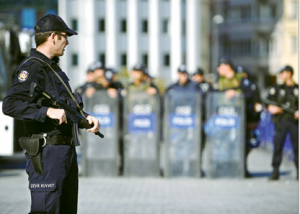By Max Security’s Intelligence Department
Today’s shooting in Istanbul’s Topkapi Palace area raised fears over the possibility of a return of a renewed terror wave in the city, just weeks after a lone gunmen hijacked a ferry in the Marmara Sea. Indeed, the past few months have seen a notable rise in attacks in Turkish urban centers, most often by Kurdish-linked militants. Despite these incidents, Turkey’s major cities remain considerably safe, especially given the multitude of extremist groups who seek to carry out attacks.
Ever since the Kurdistan Workers Party (PKK) broke a longstanding ceasefire agreement in the summer of 2011, tension with between Turks and ethnic Kurds has risen dramatically, prompting splinter PKK factions to carry out attacks in urban centers. In addition to these factions, Chechen militants and Al Qaeda groups also seek to attack Turkey in retribution for its percieved cooperation in the war on terror.

As Turkey’s economic and cultural base, Istanbul provides a favorable target for these groups to carry out attacks. Despite these threats, Istanbul has survived relatively unscathed from a persistent terror campaign. First and formost, successful attacks have been limited to those by “Lone wolf” assailants with primitive tactics and smalls arms, rarely causing casualties. Today’s attack at Topkapi is one such example. The failure of more compitent groups to carry out attacks is attributed to the high level operational capability enjoyed by Turkish intelligence and security forces in urban centers. Police carry out constant raids and arrests in order to pre-empt attacks in their early planning stages, while maintaining a hieghtened presence in sensative areas. Even unsanctioned political protests are often thwarted by security forces before they can fully materialize.
Despite the ongoing successes in counter-terrorism, there are still a number of threats posed to foreigners conducting business in Istanbul, both directly and indirectly. Certain districts are hotbeds of sectarian tension, including Beyoglu and Zeytinburnu, both of which has seen sporadic violence in the form of firebombings against police stations. In addition, many areas of Istanbul require travelers to exercize the same vigilance and common sense that they would in any major city, keeping alert for petty crime and pickpocketing, especially at night and in lowerclass districts. Most importantly, history shows that often times counter terror efforts are not always 100 effective, often times resulting in tragic consequences. Strategicaly important areas, including airports, bus terminals, and iconic locations such as Taksim square, are all potential targets, many of which have been attacked in the past.
As far as travel security goes -Travelers should not hesitate to take advantage of all that Istanbul has to offer, but they should remain aware to the tense security reality currently facing Turkey at the moment.